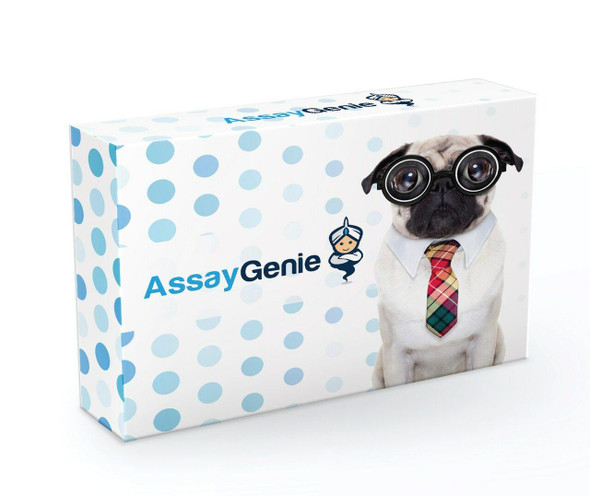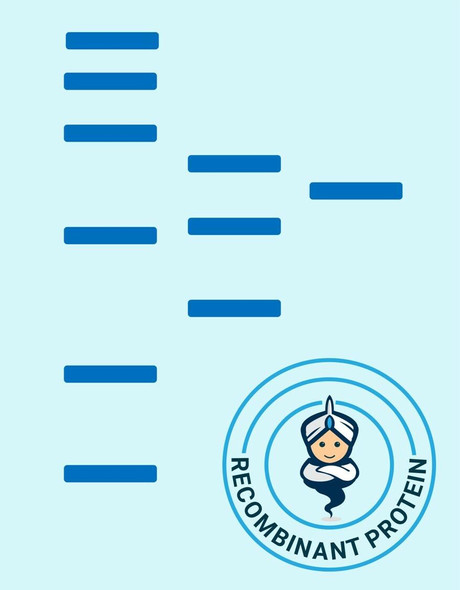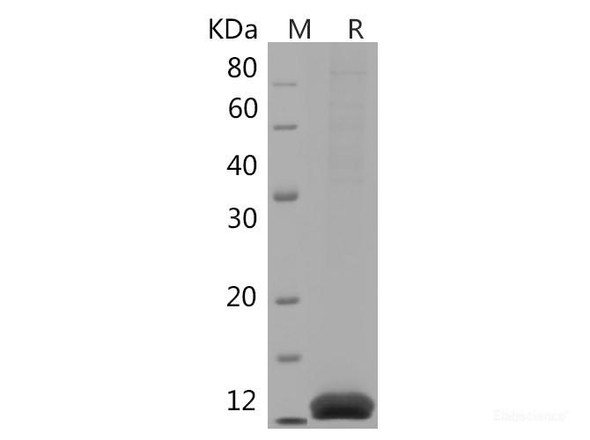Description
| Product Name: | Human IL 2 Recombinant Protein |
| Product Code: | RPPB0480 |
| Size: | 10µg |
| Species: | Human |
| Target: | IL 2 |
| Synonyms: | T-cell growth factor (TCGF), Aldesleukin, Lymphokine, IL-2, IL2. |
| Source: | Escherichia Coli |
| Physical Appearance: | Sterile Filtered clear solution. |
| Formulation: | Interleukin-2 His-Tag protein is supplied in 20mM Tris-HCl pH-8 and 50% glycerol. |
| Stability: | Store at 4°C if entire vial will be used within 2-4 weeks. Store, frozen at -20°C for longer periods of time. Please avoid freeze thaw cycles. |
| Purity: | Greater than 90.0% as determined by SDS-PAGE. |
IL2 is a secreted cytokine that is important for the proliferation of T and B lymphocytes. The receptor of this cytokine is a heterotrimeric protein complex whose gamma chain is also shared by interleukin 4 (IL4) and interleukin 7 (IL7). The expression of this gene in mature thymocytes is monoallelic, which represents an unusual regulatory mode for controlling the precise expression of a single gene. The targeted disruption of a similar gene in mice leads to ulcerative colitis-like disease, which suggests an essential role of this gene in the immune response to antigenic stimuli.
Interleukin-2 Human Recombinant produced in E.Coli is a single, non-glycosylated, Polypeptide chain containing 133 amino acids fragment (21-153) having a molecular weight of 20kDa and fused with a 4.5kDa amino-terminal hexahistidine tag. The IL-2 His is purified by proprietary chromatographic techniques.
| UniProt Protein Function: | IL2: Produced by T-cells in response to antigenic or mitogenic stimulation, this protein is required for T-cell proliferation and other activities crucial to regulation of the immune response. Can stimulate B-cells, monocytes, lymphokine- activated killer cells, natural killer cells, and glioma cells. A chromosomal aberration involving IL2 is found in a form of T-cell acute lymphoblastic leukemia (T-ALL). Translocation t(4;16)(q26;p13) with involves TNFRSF17. Belongs to the IL-2 family. |
| UniProt Protein Details: | Protein type:Cytokine; Secreted; Secreted, signal peptide; Oncoprotein Chromosomal Location of Human Ortholog: 4q26-q27 Cellular Component: extracellular space; extracellular region Molecular Function:growth factor activity; interleukin-2 receptor binding; kinase activator activity; cytokine activity; carbohydrate binding; glycosphingolipid binding; kappa-type opioid receptor binding Biological Process: positive regulation of isotype switching to IgG isotypes; negative regulation of heart contraction; natural killer cell activation; positive regulation of activated T cell proliferation; negative regulation of lymphocyte proliferation; elevation of cytosolic calcium ion concentration; negative regulation of protein amino acid phosphorylation; cell-cell signaling; protein kinase C activation; positive regulation of cell proliferation; positive regulation of B cell proliferation; cell adhesion; T cell differentiation; positive regulation of interleukin-17 production; regulation of T cell homeostatic proliferation; positive regulation of regulatory T cell differentiation; positive regulation of immunoglobulin secretion; positive regulation of cell growth; positive regulation of tissue remodeling; positive regulation of interferon-gamma production; positive regulation of tyrosine phosphorylation of Stat5 protein; negative regulation of inflammatory response; positive regulation of transcription from RNA polymerase II promoter; immune response; negative regulation of B cell apoptosis; positive regulation of inflammatory response; negative regulation of apoptosis |
| NCBI Summary: | The protein encoded by this gene is a secreted cytokine that is important for the proliferation of T and B lymphocytes. The receptor of this cytokine is a heterotrimeric protein complex whose gamma chain is also shared by interleukin 4 (IL4) and interleukin 7 (IL7). The expression of this gene in mature thymocytes is monoallelic, which represents an unusual regulatory mode for controlling the precise expression of a single gene. The targeted disruption of a similar gene in mice leads to ulcerative colitis-like disease, which suggests an essential role of this gene in the immune response to antigenic stimuli. [provided by RefSeq, Jul 2008] |
| UniProt Code: | P60568 |
| NCBI GenInfo Identifier: | 45593462 |
| NCBI Gene ID: | 3558 |
| NCBI Accession: | P60568.1 |
| UniProt Secondary Accession: | P60568,P01585, |
| UniProt Related Accession: | P60568 |
| Molecular Weight: | 153 |
| NCBI Full Name: | Interleukin-2 |
| NCBI Synonym Full Names: | interleukin 2 |
| NCBI Official Symbol: | IL2�� |
| NCBI Official Synonym Symbols: | IL-2; TCGF; lymphokine�� |
| NCBI Protein Information: | interleukin-2; aldesleukin; T cell growth factor; involved in regulation of T-cell clonal expansion |
| UniProt Protein Name: | Interleukin-2 |
| UniProt Synonym Protein Names: | T-cell growth factor; TCGF; INN: Aldesleukin |
| Protein Family: | Interleukin |
| UniProt Gene Name: | IL2�� |
| UniProt Entry Name: | IL2_HUMAN |










